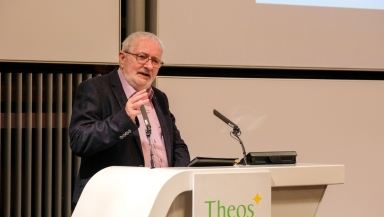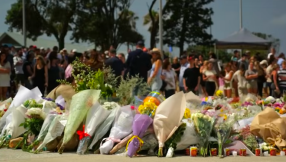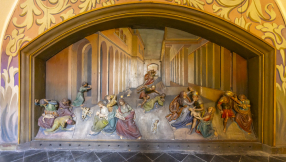"Atheism is nothing like as easy as it looks."

So said Terry Eagleton, esteemed literary theorist and public intellectual, who last night gave the annual Theos lecture in London. Eagleton gave a talk titled 'The Death of God and the War on Terror'. He explored the relationships between society's attitude to the divine, and the culture – or culture wars – that flow from that. Here are three key insights he shared.
The 'Death of God'
Eagleton described the history of modernity as being "littered with the rubble of failed surrogates for the Almighty". Western society, once deeply religious, has largely thrown off its allegiance to the trancendent, but this left large shoes to fill. Finding a surrogate for God has not been easy. In Eagleton's words: "Religion is an exceedingly hard act to follow. It has, in fact, proved to be far the most tenacious, enduring, widespread, deep-seated symbolic system humanity has ever known, not least because it is able to connect the everyday customs and practices of billions upon billions of ordinary people with the most august, transcendent, imperishable truths. It's the most successful form of popular culture in human history, though I wager you won't find it on a single cultural studies course."
However, one element of society has made an impressive replacement. "Today, the most successful substitute for religion is sport," said Eagleton. "It is sport which is the opium of the people, which lays on the weekly liturgies, supplies the canon of legendary heroes and provides the sense of solidarity which one might previously have found in a chapel or cathedral."
The 'Death of God' in western society may have begun with Nietzsche's famous pronouncement (that "God is dead...and we have killed him") but only truly came to pass with the advance of capitalist postmodernity. We now live in a faithless culture free of convictions, afraid of belief and motivated ultimately by profit.
Deeper questions about meaning and faith are relegated to the private, personal sphere, not considered to be of societal importance. Belief is "commercially superfluous". This is why Eagleton can call postmodernity "the first thoroughly atheist civilisation". This is not to be seen as the fruit of the New Atheism of people like Richard Dawkins, which champions human reason over childish "faith". Rather it is about the "routine practices" of Capitalism which shape a society which has no need of, or interest in, God. The God question isn't relevant to capitalism: "The market would continue to behave faithlessly even if every one of its participants were a born-again evangelical."
The War on Terror
"And what was the next enormous irony to happen along at just that point?" Eagleton asked. "Two aircraft slammed into the World Trade Center." Though the West 'killed God', he would eventually rear his head in a new form, from a new direction, now on the side of religious fundamentalists. 9/11 brought God back in a way that western capitalism wasn't ready for.
In a tragic irony, radical Islamist anti-West fanaticism would be revealed to have been in part a creation of the West. In Eagleton's words: "An agnosticism designed to ward off fanaticism actually succeeded in stoking it through its predatory foreign policies. So the West has helped to spawn not only secularism but fundamentalism as well." This leaves us with two warring factions, says Eagleton: "a world divided between those who believe too much and those who believe too little". The polarisation is so deep that each side ultimately reinforces the other.
We create our own enemies. But Eagleton constructively, and hopefully, noted that the divide is not simply about Good vs. Evil, but is rather about how how fear and anxiety can drive us all - as fallen human beings - to dark places. In Eagleton's words: "Fundamentalism – whether Texan or Taliban – has its source in anxiety rather than hatred".
Radical Christianity
How does the Church respond to all this? Eagleton gave no clear answers or prophecies about where culture might go next. He did however point to the power of the radical message of Christ, and the challenging, costly call to love.
The real, powerful love that Christ embodied was not mere sentimental feeling, but a practical costly way of life. In Eagleton's words: "The love of the New Testament is the love of strangers and enemies."
Eagleton criticised the "extraordinary liberal piety" of "English middle-of-the-road-ism". He suggested that the Church often spends a lot of time trying to disguise its own extreme nature to society, when it is in reality, inescapably radical: "Christianity is a kind of extremism. Jesus is not a Guardian reader. You're either with him or against him."
Eagleton doesn't advertise his own faith position, and eschews any precise labels, but appears to be somewhere in the region of 'left-leaning Catholic'. He mentioned several times the radical love seen in Christianity and the costly call to follow. For him faith is not simply about a mental assent to a particular proposition, but rather a radical way of life. In his words: "Faith is what you get killed for."













